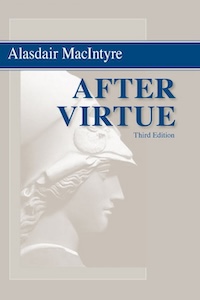After Virtue, Chapter 9
04 Nov 2025

After Virtue: A Study in Moral Theory, Third Edition
Alasdair MacIntyre
University of Notre Dame Press, 1981, 2007
Chapter 9 — Nietsche or Aristotle? first stage of argument complete
The Marxist critique of ideology is yet another attempt by social science to produce lawlike generalizations.
How has morality become a mask for arbitrary will and preference?
It works like “taboo” rules which depend on background beliefs (cosmology, taxonomy, etc.), the loss of which impoverishes the meaning of the word though it will still be used. But without any new interpretation/justification, it will lose its power.
The case is the same for our moral language - so we must investigate the historical background beliefs if we are to understand the words we use
Nietzche correctly saw that people in his day were using moral language as a disguise for their arbitrary will and preference, but jumped to conclusions about the nature of morality as such. Thus, Nietzche urges the replacement of reason and the illusion of rationally justified morality with the will.
Erving Goffman’s sociology of everyday life is the small-scale counterpart to Nietzche and Weber’s theories. For Goffman, there is no objective merit or “good”, only what the society decides — therefore, he treats honor as the chief good. (Note that “honor” here is a very different concept from that in Aristotle)
Nietzche’s moral philosophy — in particular the contention that all rational vindications of morality fail — was written in response to the failure of the attempts of the Enlightenment to justify morality, which in turn were undertaken following the rejection of Aristotle. So the REAL question is, was it right to reject Aristotle? If so, we have to follow Nietzche’s conclusions.
This is not to say that Aristotle is the only alternative, but it is to say that in the pre-modern world, it was the most powerful & influential. So if we’re not going to go the Enlightenment route and end up with Nietzsche, Aristotle or something very like him must be vindicated.
A couple of considerations before investigating:
1. Modern morality is concerned with what rules must be followed. Virtue becomes a utilitarian means to following the rules better. But if we suppose virtue has primacy of place over what the rules are and why to follow them, investigation will look different than one might expect.
2. AM must write a history of Aristotelianism outlining a whole tradition of which Aristotle himself is only a [central] part